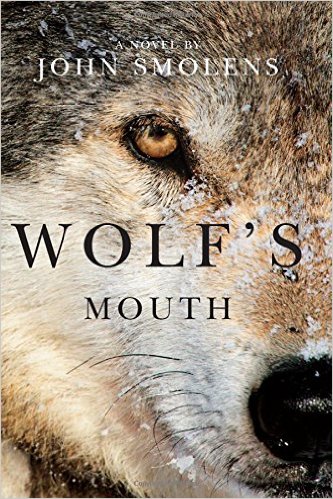By ERIC FREEDMAN
Capital News Service
LANSING — The obvious evidence of World War II prisoner of war camps in the Upper Peninsula is becoming less and less visible as the years and decades pass.
At the site of what was Camp AuTrain in Alger County, for example, “there’s hardly any remaining evidence, just a few signs of stone foundations and fence lines,” said Marquette novelist John Smolens, who visited there several times in writing his new book, “Wolf’s Mouth” (Michigan State University Press, $26.95).

Credit: Michigan State University Press.
The book focuses on a young Italian army captain who is sent to AuTrain in 1944, incurs the wrath of the camp’s highest-ranking Nazi officer and escapes to the Lower Peninsula to avoid being killed.
The later parts of the novel take place largely in postwar Detroit, with a number of scenes set in Sault Ste. Marie.
The remnants of AuTrain, near Munising, now lie within the Hiawatha National Forest. Housing about 200 prisoners, it was one of more than 20 POW camps in Michigan, including five in the UP that originally served as Depression-era Civilian Conservation Corps camps.
“The POW camps up here don’t get much attention, yet whenever I mention them I can tell that people are really quite intrigued by the notion that so many captured soldiers lived here with hardly anyone’s knowledge,” said Smolens, a 66-year-old retired English and creative writing professor at Northern Michigan University who previously taught at Michigan State.
POWs in the UP generally worked in logging while those in Lower Peninsula camps usually were agricultural laborers because so many American forest and farm workers joined the military, Smolens said.
Smolens’ main character in the novel, Capt. Francesco Verdi, had been captured in North Africa while assigned to Germany’s Afrika Korps. Shipped across the Atlantic, he traveled from Boston to Detroit by train, was ferried across the Straits of Mackinac and then taken by train to Camp AuTrain.
Verdi explains, “Our purpose was to cut down trees. Some camps provided farm labor, while others, like ours, produced lumber. Toiling in Michigan’s Upper Peninsula was healthy if tedious, but preferable to fighting in the African desert.”
Smolens said that nationally, more than 425,000 captured troops from the European theater — most of them German, Italian or Austrian — were sent to POW camps in the United States.
The idea for the plot of his book came more than 15 years ago when Smolens read a series of local newspaper articles about the UP camps.
“Most people didn’t even know they were there during the war,” he said, adding that such information is the kind of thing “you tuck in the back of your mind as a novelist.”
Beyond the physical description of the camp and the northern woods, Smolens said he was most interested in what life was like for the prisoners.
“For the most part, the POWs were quite content with their circumstances, at least as they were treated by the Americans,” he said. They often were allowed to go unescorted into town, for example.
“There was remarkable freedom for these POWs, considering,” he said. “Of course, here in the UP they were so far from everything.”
Few tried to escape from camps in the UP — not surprisingly given their remoteness and the harshness of the environment.
And every POW camp — like AuTrain in the novel — had “certain German officers who were adamant in maintaining a Nazi perspective on how life went on,” he said. “You can’t soft-pedal Nazis.”
Fiction followed fact: Even after World War II in the 1950s and 1960s — in real life as in the novel — there were instances where Nazis formerly imprisoned in the camps carried out reprisals against ex-prisoners like Verdi who had defied or challenged their authority.
“They never forgot,” Smolens said.
Smolens’ latest projects are a just-completed collection of short stories and a novel-in-progress about a group of people stranded together in a house in the woods during a UP blizzard.
“I like blizzards,” he said.
ADDITIONAL INFORMATION FOR CNS EDITORS
“Wolf’s Mouth” information from Michigan State University Press: http://msupress.org/books/book/?id=50-1D0-33FB#.VtAtJ-bMJWA.